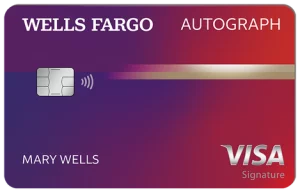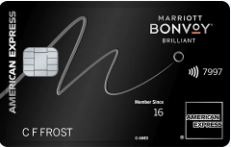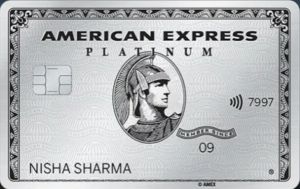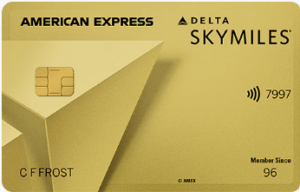Best Credit Cards That Provide Travel Insurance
About Megan
Megan Brame is a five-time award-winning content strategist whose content centers around helping others develop a better understanding of finance and marketing. Her website is https://bramecreative.com
Read full bio
At a Glance
Ending up somewhere without your luggage (or a flight home) can ruin even the most well-planned of trips. Luckily several credit cards have your back with robust travel insurance. Hopefully, you’ll never need it, but if you do, these are the cards you’ll be glad to have.
In this article, you’ll learn:
- Comparing best credit cards with travel insurance
- Summary of the credit cards for travel insurance
- What does travel insurance cover
- How does travel insurance work on credit cards
- Pros and cons of credit card travel insurance
- How to pick a credit card for travel insurance
- Is travel insurance worth it
- Methodology
- FAQs
Comparing the best credit cards with travel insurance
Wells Fargo Autograph Visa Card®
Travel insurance coverage:
- Roadside dispatch: The Wells Fargo Autograph card offers roadside dispatch services to help you in case you are stuck
- Travel accidents: Travel and emergency assistive services are available to Wells Fargo Autograph card holder
- Rental car insurance: Maximum coverage of $50,000 covered for a maximum of 15 consecutive days
Annual fee: $0 annual fee
Intro APR: 0% introductory rate for 12 months from the date of account opening
Regular APR: Either 20.24%, 25.24%, or 29.99% based on credit worthiness
Signup bonus: Earn 20,000 bonus points equivalent to $200 when you spend $1,000 in the first 3 months of opening the account
Our verdict: The Wells Fargo Autograph Visa Card® offers robust travel insurance coverage, making it an excellent choice for frequent travelers among credit cards with travel protection. With comprehensive benefits such as trip cancellation, interruption, and rental car insurance, cardholders can travel with confidence. Additionally, the generous signup bonus and introductory APR offer further incentives for cardholders.
Pros:
- Comprehensive travel insurance coverage for various contingencies
- Collision Damage Waiver coverage for rental cars adds value for travelers
- Lucrative signup bonus and introductory APR offer
Cons:
- Some other cards may offer higher rewards rates for specific spending categories
Apply now: Wells Fargo Autograph℠ Card
Learn more: Wells Fargo Autograph Card Review
Chase Sapphire Reserve®
Travel insurance coverage:
- Trip cancellation: Up to $10,000 per person and $20,000 per trip. Maximum benefit of $40,000 per 12-month period.
- Trip interruption: Up to $10,000 per person and $20,000 per trip. Maximum benefit of $40,000 per 12-month period.
- Trip delay: Up to $500 per ticket for delays of more than six hours.
- Baggage delay: Up to $100 per day for five days.
- Lost luggage: Up to $3,000 per passenger.
- Travel accidents: Up to $1,000,000.
- Rental car insurance: Up to $75,000.
Annual fee: $550
Intro APR: N/A
Regular APR: 22.24%-29.24%
Signup bonus: Earn 60,000 bonus points after you spend $4,000 on purchases in the first 3 months from account opening. That’s $900 toward travel when you redeem through Chase Ultimate Rewards®
Our verdict: The power of the Sapphire Reserve lies in its generous $300 annual travel credit that can be used liberally. Plus, with its expansive insurance coverage (including the rarely-seen primary rental car coverage) and generous bonus earning categories, it’s no secret why this is one of the most popular travel credit cards around.
Pros:
- $300 annual travel credit.
- 5x points on flights and 10x points on hotels and rental cars purchased via Chase Ultimate Rewards.
- Complimentary Priority Pass Select membership.
- Lyft Pink All Access complimentary membership for 2 years.
Cons:
- $550 annual fee.
- Requires excellent credit.
- Rewards portal can be limiting.
Apply now: Chase Sapphire Reserve®
Marriott Bonvoy Brilliant® American Express® Card
Travel insurance coverage:
- Lost luggage: Up to $2,000 for checked bag and up to $3,000 for checked and carry-on bag. New York state residents get $2,000 per bag, up to a maximum of $10,000 for all covered persons per trip.
- Travel accident insurance: Up to $500,000.
- Rental car insurance: Up to $75,000.
- Trip delay insurance: Up to $500 per trip. Maximum benefit of $1,000 per 12-month period.
- Trip cancellation: Up to $10,000 per trip. Maximum benefit of $20,000 per 12-month period.
- Trip interruption: Up to $10,000 per trip. Maximum benefit of $20,000 per 12-month period.
Annual fee: $650
Intro APR: N/A
Regular APR: 20.74%-29.74%
Signup bonus: Earn 150,000 Marriott Bonvoy bonus points after you use your new Card to make $6,000 in purchases within the first 6 months of Card Membership. Plus, earn 50,000 Marriott Bonvoy bonus points after you stay 6 eligible paid nights at hotels participating in Marriott Bonvoy through 1/31/24. Offer ends 8/9/2023.
Our verdict: Marriott boasts one of the largest global collections of hotels out of most major brands, so they’re a good brand to get a card with if you’re someone who loves to explore new places. Plus, your automatic enrollment into their Platinum Elite status gets you upgraded rooms on the house.
Pros:
- Automatic Platinum Elite status.
- $300 annual Brilliant Dining Credit.
- Free night award annually.
- $100 Luxury Property credit annually.
- Cell phone loss/damage protection.
Cons:
- $650 annual fee.
- Only useful if you plan to stay at Marriott properties often.
Apply now: Marriott Bonvoy Brilliant American Express Card
Capital One Venture Rewards Credit Card
Travel insurance coverage:
- Lost luggage: Up to $3,000 per passenger. For New York state residents, coverage is limited to $2,000 per bag.
- Travel accident insurance: Up to $250,000.
- Rental car insurance: Covers damage or theft with restrictions. Eligible rental periods are limited to 15 consecutive days in the cardholders home country or 32 consecutive days outside it.
Annual fee: $95
Intro APR: N/A
Regular APR: 20.74%-28.74%
Signup bonus: Enjoy a one-time bonus of 75,000 miles once you spend $4,000 on purchases within 3 months from account opening, equal to $750 in travel.
Our verdict: If you’re someone who isn’t ready to commit to a card with an expensive annual fee, the Venture Rewards Credit Card is a great option. With flexible redemption categories and good travel insurance coverage, this card can become a favorite for your wallet quickly.
Pros:
- Excellent rewards earning rate.
- Flexible redemption options.
- Robust travel insurance coverage for luggage, accidents, and rental cars.
- Two complimentary visits per year to Capital One Lounges or over 100 Plaza Premium Lounges.
Cons:
- $95 annual fee.
- Few travel partners that work with Capital One miles.
Apply now: Capital One Venture Rewards Credit Card
The Platinum Card® from American Express
Travel insurance coverage:
- Trip cancellation: Up to $10,000 per trip. Maximum benefit of $20,000 per 12-month period.
- Trip interruption: Up to $10,000 per trip. Maximum benefit of $20,000 per 12-month period.
- Lost luggage: Up to $3,000 per passenger.
- Travel accident insurance. Up to $500,000.
- Rental car insurance: Up to $75,000.
Annual fee: $695
Intro APR: N/A
Regular APR: 20.99% to 28.99%
Signup bonus: Earn 80,000 Membership Rewards® Points after you spend $6,000 on purchases on the Card in your first 6 months of Card Membership.
Our verdict: “Go big or go home” should be the tagline of this premium card from American Express. While it comes with one of the highest annual fees around, its suite of powerful insurance coverage stacks nicely with its included membership perks like Delta lounge access, Global Assist Hotline, Concierge service, and more.
Pros:
- Large collection of travel partners.
- Delta SkyClub access.
- Priority Pass membership.
- Global Assist Hotline.
- Concierge service.
- Elite status upgrades at multiple hotel and rental car partners.
Cons:
- $695 annual fee.
- Requires excellent credit.
- Charge card that has complicated Pay Over Time APR.
- Complicated rewards/statement credit requirements.
Apply now: American Express Platinum Card
Delta SkyMiles® Gold American Express Card
Travel insurance coverage:
- Lost carry on luggage: Up to $1,250 per person for carry on baggage while in direct transit to or from a common carrier terminal, while traveling on a common carrier or while at a common carrier terminal.
- Lost checked luggage: Up to $500 per person while traveling on a common carrier.
- Rental car insurance: Up to $50,000.
Annual fee: $0 first year then $95
Intro APR: N/A
Regular APR: 20.74%-29.74%
Signup bonus: Earn 65,000 bonus miles after you spend $2,000 in purchases on your new card in your first six months.
Our verdict: If you’re someone who loves to fly Delta, this card is for you. Not only does it come with a generous luggage reimbursement, but the added perks of free checked bags and early boarding give you a little bit of luxury without the exorbitant annual fee other cards charge.
Pros:
- Free checked bags.
- Insurance for checked or carry-on luggage.
- Priority boarding.
Cons:
- Annual fee.
- Only good for those planning to use Delta often.
Apply now: Delta SkyMiles® Gold American Express Card
Summary of the credit cards for travel insurance
*Updated as of February 2024
| Credit Card | Rewards Rate | Welcome Offer | Annual Fee | APR | Credit Needed |
|---|---|---|---|---|---|
| Wells Fargo Autograph Visa Card | Earn unlimited 3x points on travel, streaming, gas, phone plans, transit, and dining; Earn 1% on all other purchases | Earn 20,000 bonus points equivalent to $200 when you spend $1,000 in the first 3 months of opening the account | $0 | 20.24%, 25.24%, or 29.99% | Good |
| Chase Sapphire Reserve | Earn 5x points on flights booked through Chase travel, 10x points on hotels through Chase travel, 3x points on dining at restaurants including delivery, and 10x points on Chase dining purchases | Earn 60,000 bonus points after you spend $4,000 on purchases in the first 3 months from account opening. That’s $900 toward travel when you redeem through Chase Ultimate Rewards® | $550 | 22.24%-29.24% | Excellent |
| Marriott Bonvoy Brilliant® American Express® Card | Earn 6x points on each dollar at hotels, 3x at restaurants, and 2x on all other purchases | Earn 150,000 Marriott Bonvoy bonus points after you use your new Card to make $6,000 in purchases within the first 6 months of Card Membership. Plus, earn 50,000 Marriott Bonvoy bonus points after you stay 6 eligible paid nights at hotels participating in Marriott Bonvoy through 1/31/24. | $650 | 20.74%-29.74% | Excellent |
| Capital One Venture Rewards Credit Card | Earn unlimited 2 miles per dollar on every purchases and unlimited 5 miles per dollar on hotels and rental cars booked through Capital One Travel | Enjoy a one-time bonus of 75,000 miles once you spend $4,000 on purchases within 3 months from account opening, equal to $750 in travel. | $95 | 20.74%-28.74% | Good |
| The Platinum Card® from American Express | Earn 5x membership rewards points on flights and hotels booked through Amex travel along with 1x points on all other purchases | Earn 80,000 Membership Rewards® Points after you spend $6,000 on purchases on the Card in your first 6 months of Card Membership. | $695 | 20.99% to 28.99% | Excellent |
| Delta SkyMiles® Gold American Express Card | Earn 2x miles on Delta purchases, 2x miles on restaurants, 2x miles at U.S. supermarkets, and 1x miles on all other eligible purchases | Earn 65,000 bonus miles after you spend $2,000 in purchases on your new card in your first six months. | $0 for the first year then $95 | 20.74%-29.74% | Good |
What does travel insurance cover?
Travel insurance isn’t one specific thing and will often vary based on your credit card. Generally speaking, these are a few things you can expect it to cover:
Lost/damaged/late luggage – If your bags go missing or are on another flight and won’t arrive until later, you could be reimbursed for whatever you spend to replace your missing items.
If your trip is affected by something outside your control – Delays, cancellations, and interruptions are all popular categories of travel insurance coverage. Depending on the situation, you could be reimbursed for any costs you have to pay out of pocket to cover a change in your trip.
Insurance coverage – Some cards will offer primary or secondary car insurance coverage for rental cars. Some premium-tiered cards will also offer reimbursement for medical expenses you face overseas, too.
How does travel insurance work on credit cards?
Seeking travel insurance through credit cards can be confusing at the surface. Travel insurance provided by credit cards benefits cardholders, offering coverage for various travel-related expenses and emergencies. When cardholders use their credit card to pay for eligible travel expenses like flights, hotels, or rental cars, they may automatically receive insurance coverage. Credit cards with trip insurance often include benefits such as trip cancellation/interruption, emergency medical and dental coverage, lost luggage reimbursement, and travel accident insurance.
However, the specific details, limits, and eligibility criteria of this coverage vary depending on the credit card issuer and the type of card held by the cardholder. In some cases, cardholders may need to activate their coverage or fulfill certain requirements, such as paying for the entire trip with their credit card, to access insurance benefits. Should a covered incident occur during travel, cardholders would typically need to file a claim with either the credit card issuer or the insurance provider associated with the card, providing documentation to support their claim.
It’s crucial for cardholders to carefully review the terms and conditions of their credit cards’ travel insurance coverage to understand what is covered, what isn’t, and how to access benefits when needed.
Pros and cons of credit card travel insurance
Evaluating whether or not credit card travel insurance actually matters to you when considering different cards is important. Fortunately, there are notable advantages and disadvantages which can help you to figure this out:
| Pros | Cons |
|---|---|
| Convenient and often included | Limited coverage options compared to standard travel insurance |
| No additional cost in most cases | Coverage may vary between credit cards |
| May offer multiple sub-benefits | Exclusions and limitations often apply |
| Can provide you with peace of mind | May require some type of activation |
| May offer rewards or points | Claims process can be complex |
How to pick a credit card for travel insurance
Deciding on the right credit card offering travel insurance as a benefit can be extremely difficult, but use the following tips to make the decision easier
- Assess the types of travel insurance coverage offered, such as trip cancellation/interruption, emergency medical, lost luggage reimbursement, and rental car insurance.
- Consider the coverage limits and exclusions to ensure they meet your travel needs.
- Compare the annual fees and any additional costs associated with the credit card.
- Evaluate the card’s rewards program and other benefits in addition to travel insurance.
- Review any activation requirements or conditions for maintaining coverage.
- Check for any restrictions on travel destinations or lengths of trips covered by the insurance.
- Read customer reviews and ratings to gauge the overall satisfaction with the card’s travel insurance benefits.
- Consider the card issuer’s reputation for customer service and claims processing efficiency.
Is travel insurance worth it?
Travel insurance offers valuable protection against unexpected situations during trips, such as trip cancellations, medical emergencies, and lost luggage. Whether it’s worth it depends on factors like the level of coverage, your travel plans, and existing insurance on any credit cards you may have which offer it.
For frequent travelers or those with significant trips, it can provide peace of mind and financial security. However, for shorter or less expensive trips, or those with comprehensive coverage elsewhere, the additional cost may not be justified. Assessing your specific needs and existing coverage can help you decide whether travel insurance via a credit card is worth it for you.
Methodology
The methodology used to calculate the best cards for fair credit relied on several factors, with the most prominent of those being:
- The required credit score to apply successfully for the card.
- The additional benefits offered by the card beyond rewards.
- The rewards rate of the card, if applicable.
- Overall difficulty in securing the credit card with fair credit.
- The history of the card issuer itself.
- Any potential costs associated with owning the credit card.
The product information provided here is based on research conducted up to a specific date and may have changed. For the latest and most accurate information, we recommend you to visit the respective card’s website before proceeding.
FAQs
When considering a credit card with travel insurance, look for comprehensive coverage that includes benefits such as trip cancellation/interruption, emergency medical and dental coverage, lost luggage reimbursement, travel accident insurance, and rental car insurance. Additionally, pay attention to coverage limits, exclusions, and any requirements for activating the insurance.
You may want to consider adding more travel insurance when the coverage provided by your credit card is insufficient for your needs. This might include situations where you require higher coverage limits, additional types of coverage not provided by your card, or if you’re engaging in activities not covered by your card’s insurance, such as extreme sports or adventure travel.
Credit card travel insurance typically covers the cardholder, their spouse or domestic partner, and dependent children under a certain age (often up to 18 or 23 years old). Some cards may extend coverage to additional family members traveling with the primary cardholder, but it’s essential to review the specific terms and conditions of your card’s policy.
Credit card travel insurance can provide valuable coverage, but whether it’s enough depends on your individual needs and the level of protection required for your trip. It’s essential to review the coverage provided by your credit card and assess whether it adequately addresses potential risks and contingencies you may encounter during your travels. In some cases, supplementing with additional travel insurance may be advisable.
To determine if your credit card offers travel insurance, review the benefits guide provided by your card issuer. You can typically find this information online or by contacting your card issuer directly. Look for details regarding the types of coverage offered, coverage limits, eligibility criteria, and any activation requirements. Additionally, you can inquire about coverage specifics before booking your trip to ensure you understand what is and isn’t covered.
To file a travel insurance claim with your credit card issuer, you’ll typically need to contact the insurance provider associated with your card. This information can usually be found in your card’s benefits guide or on the issuer’s website. Be prepared to provide documentation to support your claim, such as receipts, medical records, police reports (in the case of theft or loss), and any other relevant information. Follow the instructions provided by the insurer for submitting your claim, and be aware of any deadlines for filing.















